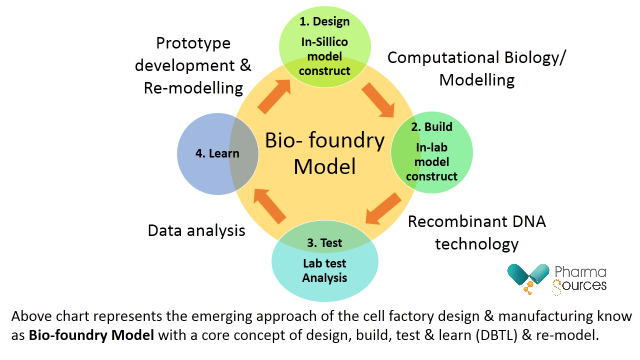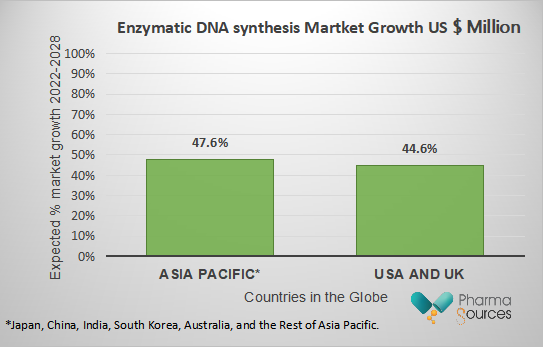Shruti TalashiAugust 08, 2023
Tag: Bio-foundry , AI , Bio-manufacturing
Pharmaceutical industries are changing their approach to drug discovery, the new in trend is bio-manufacturing based on bio-foundry model approach. Pharmaceutical industries has started to investing funds for establishing bio-manufacturing research & development lab. Let us understand what is the driving force? A fear of healthcare failure during the pandemic like COVID-19. Following the global spread of the SAR-CoV-2 virus, the pharmaceutical industry are currently undergoing significant changes. The world fell in need for a rapid response for immunizations, since the speed at which the new viral infection has spread, and the health disparities it has caused globally.
Also that with the advance technologies such as artificial intelligence (AI) machine learning, big data analytics, Knowledge base platform and robotics the process of drug discovery, clinical trials, personalized medicine and supply chain management have become faster, more efficient, much cost effective and environmentally sustainable. Advances in genomic and molecular biology have facilitated the development of targeted therapies also known as precision medicines e.g. CAR-T therapy against cancer. Biologics and gene therapies are medicines derived from the living organisms and offer targeted treatment option to various diseases like medicine as gene therapies involved modifying the patient’s genetic material to treat or prevent the diseases and has shown promising results in certain areas. Many Pharmaceutical industries are increasingly collaborating and becoming partners with the biotechnology firms, academic institutes and research organizations. By doing so they are pooling resources, expertise and knowledge, allowing faster development, shared risk, and the exploration of novel therapeutic approaches. Other than the points discussed above, there are areas undergoing massive changes such as regulatory environment which is becoming more approachable and flexible to meet the timely access of the breakthrough treatments. Also if we talk about the data and digital transformation, pharm industries are leveraging it to improve research, development and patient care as this enables more informed decision-making and the development of evidence-based therapies. Few of the above briefed changes happening in the pharmaceutical industry have the potential for long term sustainability. Let us start imagining that a bacteria can make the any and all the lifesaving medicines in most cost effective and sustainable manner.
Depending on the expansion of their economies, different regions and nations around the world accept innovations in the pharmaceutical industry at varying rates. The factors slowing down these changes in the pharmaceutical industry are the different regulatory environment across countries, diverse economic development, structure and complexity of healthcare systems around the world, cultural and social factors influencing the acceptance and adoption of these changes in pharmaceutical companies, generating more related skilled employment and difference in intellectual property regulations and market dynamics. A effort was made by 15 nonprofit biofoundries from all over the world gathered in London in June 2018 to discuss the creation of the Global Biofoundry Alliance (GBA). The alliance's goals were to promote teamwork, resource sharing, and common problems in the industry. Operations issues such sustainable development, high staff retention and infrastructure maintenance costs, small user bases, and a lack of knowledge regarding biofoundry capabilities were brought up at the discussion. The lack of standards for software, hardware, and methodology presented another difficulty by impeding interoperability and efficiency. The sharing of resources and intellectual property across borders raises legal difficulties. Despite these difficulties, it is acknowledged that the development of biofoundry capabilities is essential for nations to enhance their own capabilities in synthetic/engineered biology and realize its full potential.[1]
Bio-foundry is an establishment or advance lab. facility or platform where biological systems are designed, constructed, and optimized using standardized and automated processes. It is a concept derived from the field of systems biology which aims to engineer living organisms for various applications including healthcare, biotechnology and industrial processes. Biofoundaries play a crucial role in accelerating the development and production of biopharmaceuticals, vaccines enzymes and other biological products.
The key principles that underpin the functioning of a bio foundry are standardization, automation, high-throughput approaches, data-integration and analytics, collaboration and sharing also iterative design and optimization. By following these principles, bio foundries aim to accelerate the engineering of biological systems, support the development of new biotechnologies and facilitates the translation of synthetic biology research into practical application. Synthetic biology is an interdisciplinary field that combines principle from biology, engineering and construct new biological systems or modify the existing ones. It holds the potential to revolutionize various industries and contribute to advancements in medicine and environmental sustainability.

Bio-foundaries contribute to the development, optimization and production of biopharmaceuticals by providing the right art of infrastructure, expertise and technologies necessary for prototype development, cell line development, process optimization and analytical characterization. It plays a vital role in advancing the field of biopharmaceuticals and supporting the development of innovative therapies for various life threating or even rare diseases.
Factual that cells can be modified to manufacture substances or to treat diseases that were previously incurable. However, there isn't enough knowledge accessible for anyone to scale up quickly and safely, which restricts the production of cell products for mass use. Manufacturers, as well as the general public, want to know that products created by engineering biology will be dependable and safe. Measurements that are precise and trustworthy are required. There are bio-foundries, such as the one operated by the National Institute of Standards and Technology (NIST) in Gaithersburg, Maryland US, called the Living Measurement Systems Foundry (LMSF). Such labs are programmable labs has engineering biology workflow that involves a number of common tasks that can be automated, including handling liquids, incubating samples, measuring data from multi-well plates, electro-transformation, and centrifugation. For instance, the NIST bio-foundry has a fully integrated, high-throughput system for these tasks. Simply said, the facility has the capacity to conduct thousands of tests in a short period of time, providing the information required to assess whether a challenging biological experiment will function consistently.[2]
"Many different countries have realized that the bioeconomy is going to be very important for their economy going forward. These biofoundries, including public biofoundries, are engines for accelerating the bioeconomy.” —Nathan Hillson, co-chair of the Global Biofoundries Alliance
Out of various outlined objectives, GBA will encompass people exchanges, including the creation of education and training programs for researchers and users of biofoundry facilities, as well as the exchange of sustainable business models, strategies for reducing transaction and operational costs, and ways to boosting user bases. To continuously improve GBA activities and processes, the GBA will actively and transparently engage a wide variety of stakeholders, including policymakers, industry, public funds and government agencies, as well as civil society.[1]
The National University of Singapore (NUS) has a core research program for synthetic biology called NUS SynCTI, which has been a major force in the establishment of the Global Biofoundary Alliance (GBA).[3]
India as a country from Asia is making its efforts in area of bio-foundaries. In order to completely integrate into an international alliance of other biofoundries, such as the Global Biofoundries Alliance (GBA), is the primary goal of Biofoundry India (BI).[4]
By offering competitive financing in synthetic biology for biofuel research, DBT India has already taken the initiative. It is confident that India will be within the top 5 countries globally and be recognized as a Global Biomanufacturing Hub by 2025, with the Sector growing exponentially to achieve a growth of $150 Billion. Recently, collaborative financing programs (FINSynBio) were formed by the Department of Biotechnology (New Delhi) and the Academy of Finland to advance Indo-Finnish research collaboration in synthetic biology.[5]
During the forecast period of 2021–2031, the market for next-generation bio manufacturing is anticipated to expand at a CAGR of 14.85%, reaching an estimated value of $85,201.2 million in 2031. If we look into enzymes that are used in the DNA synthesis process known as enzymatic DNA synthesis to create DNA molecules from nucleotides has huge importance with the prevalence of genetic illnesses on the rise and the focus on personalized therapy intensifying, and therefore this method is becoming more and more in demand in the biopharmaceuticals sector. For instance the market growth for enzymatic DNA synthesis in the Asia Pacific region is anticipated to reach US$ 301.49 million by 2028 from US$ 29.18 million in 2022. From 2022 to 2028, a CAGR of 47.6% is anticipated. Markets for enzymatic DNA synthesis in Japan, China, India, South Korea, Australia, and the rest of Asia Pacific are divided into these categories. From 2022 to 2028, the enzymatic DNA synthesis market is anticipated to expand at a CAGR of 44.6% in the USA and the UK. Numerous causes, such as the increased need for biopharmaceuticals, the incidence of genetic disorders, and the growing interest in customized therapy, are fueling this expansion. [6]

A collaborative approach is a must with global leadership since a bio-based economy cannot be developed without biofoundries. By collaborating, we may hasten the creation of novel bio-based goods and services that have the potential to address a variety of issues, including global warming, food security, healthcare, and environmental degradation.
Hillson, N., Caddick, M., Cai, Y. et al. Building a global alliance of biofoundries. Nat Commun 10, 2040 (2019). https://doi.org/10.1038/s41467-019-10079-2
March 13, 2020 The NIST Biofoundry: Taking Engineering Biology From Artisanal to Automated, Website: https://www.nist.gov URL: https://www.nist.gov/feature-stories/nist-biofoundry-taking-engineering-biology-artisanal-automated
01 July 2019, NUS SynCTI cofounds Global BioFoundary Alliance. Website: https://biospectrumasia.com URL: https://biospectrumasia.com/news/54/13862/nus-syncti-cofounds-global-biofoundry-alliance.html
Binay Panda , Pawan K Dhar, Building Biofoundry India: challenges and path forward, Synthetic Biology, Volume 6, Issue 1, 2021, ysab015, https://doi.org/10.1093/synbio/ysab015
Singh D, Dhar PK (2013) Exploring the Future of Synthetic Biology in India and its Probable Pathways from Infancy to Maturity. Curr Synthetic Sys Biol 1: 106. doi: 10.4172/2332-0737.1000106
Sameer Joshi, Enzymatic DNA Synthesis Market Worth $2.24 Billion, by 2028 with 45.1% CAGR – Global Report by The Insight Partners February 28, 2023, The Insight Partners, accessed August 05, 2023 URL: https://www.theinsightpartners.com/pr/enzymatic-dna-synthesis-market
Ms. Shruti Talashi boasts a dual mastery of lab research and writing. Her doctoral study outcome as M.Phil in biomedical science while studying breast cancer and an extraordinary masters degrees dissertation work on exploring role of Gal-lectin in cancer metastasis fuels her extensive research interests. She has gained few publication in journals. Bridging the science-public gap is her passion, aided by expertise in diverse techniques. From oncology to antibiotic/drugs production, she's led and managed complex projects, even clinical trials. Now, as a freelance Content Coordinator for Sinoexpo Pharmasource.com, her industry knowledge shines through valuable insights on cutting-edge topics like GMP, QbD, and biofoundry.


Contact Us
Tel: (+86) 400 610 1188
WhatsApp/Telegram/Wechat: +86 13621645194
Follow Us:




 Pharma Sources Insight January 2025
Pharma Sources Insight January 2025


